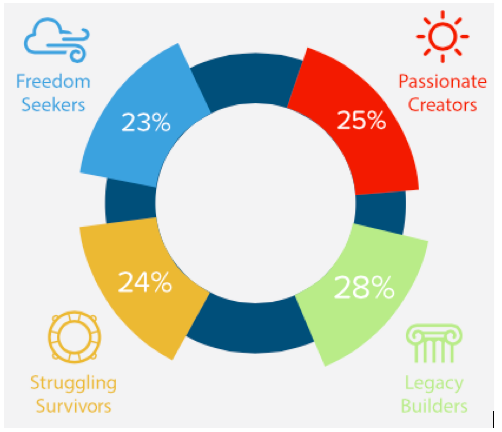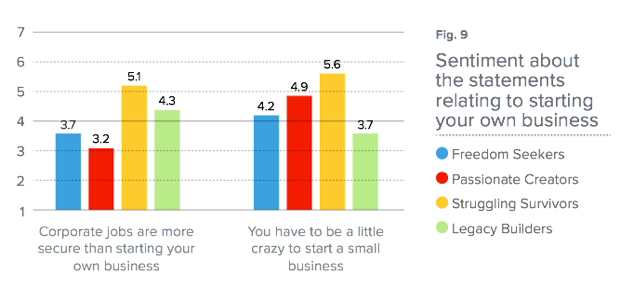 There are an estimated 23 million small businesses in America and while every small business owner will have his or her own story to tell, many of them fall into one of four broad profile definitions according to a new study by Infusionsoft.
There are an estimated 23 million small businesses in America and while every small business owner will have his or her own story to tell, many of them fall into one of four broad profile definitions according to a new study by Infusionsoft.
The 2014 Infusionsoft Small Business Market Survey queried nearly 850 American entrepreneurs to try to gain a deeper understanding of the “behaviors, challenges and mindsets of our small business owners.” The result was the emergence of four clear profiles which, say the report’s authors weren’t predetermined, but which evolved as a result of the responses from the participants.
The profiles reveal dramatically different opinions (at least among this sample group) about what it means to be a small business owner today, notwithstanding the demographics of their background and business. Let’s take a look at the profile definitions that the study identified, illustrated by this graphic from the report.
Freedom Seekers. Freedom seekers are small business owners who believe that their business choices allow them the freedom to live the lifestyle that they always wanted. They run a small business because they value the ability to control their own lives. That means their schedule, their fate, the work environment they are immersed in and even the revenue they make.
- The vast majority (81%) work from home and say that they are the least likely to go go back to an employed role.
- They are the most likely to use automation and software to tools to help them to manage their business.
Passionate Creators. Passionate creators are the people who became business owners because they just love what they do. They exhibit accomplishment and pride in their achievements and value the positive impact they make for their customers.
- They are the most likely to mentor other business owners and speak about running a small business.
- They are the most optimistic and generally show the greatest longevity and business success.
- They demonstrate the most marketing sophistication of all the groups and are more likely to use analytics to support their decision-making.
Legacy Builders. These are business owners who see their business as more of a practical choice and something that will provide them with stability for the future. They started out in business to bring something new to the marketplace, believe that small business is more ethical than the bigger players and are in it for the long haul, or at least they think they are.
- They are the least likely to have a website or to use any form of automation.
- They rely more on friends and family for guidance.
- They most likely only run one business and are less likely to have considered giving up their business.
Struggling Survivor. This group reflects the harsh reality that owning a small business can often present. They express fears and concerns about the challenges facing a small business and are skeptical about the true value of what they are doing.
- They view traditional employed roles as being more secure and earning more respect.
- More than half (51%) run their business alone, the highest proportion of any group.
- They are the least likely to report any benefits from being a business owner, the most pessimistic about the future and the most likely to have considered closing their business.
As with all reports of this kind, the study probably oversimplifies the situation with regard to the motivations and challenges behind owning a small business and had a focus on marketing automation, well, because it was conducted by Infusionsoft. Nonetheless, I thought it was some interesting insight into the makeup of the small business community and the opportunity to do some self-assessment of not only where we might stand ourselves, but maybe more importantly, from a business development standpoint, what some of our target audience might be comprised of.
As I thought about the results of this survey, I found myself thinking about some of my friends in the small to midsize business space and some of them very much fit within the realm of these descriptions. What about you? Where do you fall, if at all, within the descriptions arising as a result of this study? Equally as important, where do your customers and prospects fall? Does this impact how you sell to them?
If you’d like to see the full study results, you can download it here: The 2014 Small Business Market Survey.
Other resources on this topic:
How The Cloud Is Saving SMBs Time and Money
Small or Midsize Businesses? Without A CRM, You’re Leaving Money On The Table
Graphics source: The 2014 Small Business Market Survey
photo credit: Leo Reynolds via photopin cc


